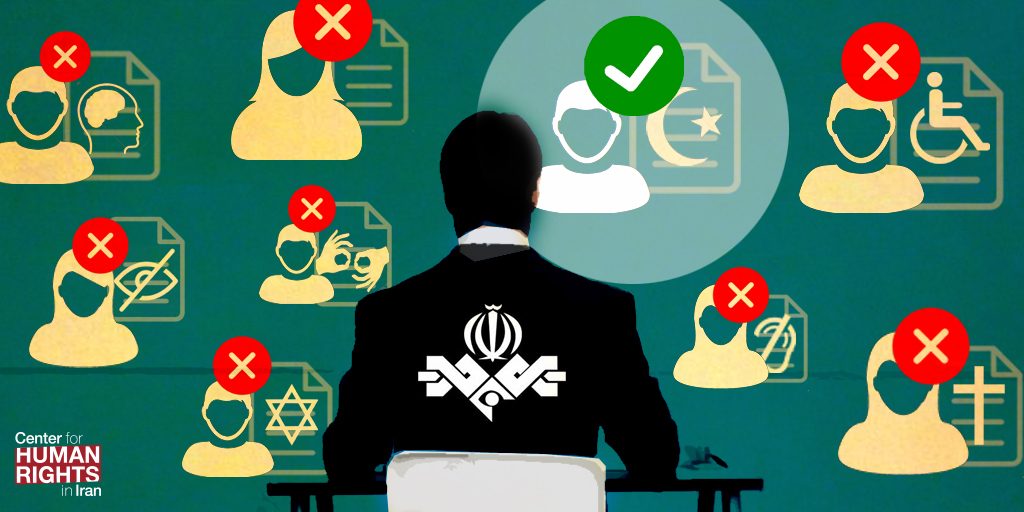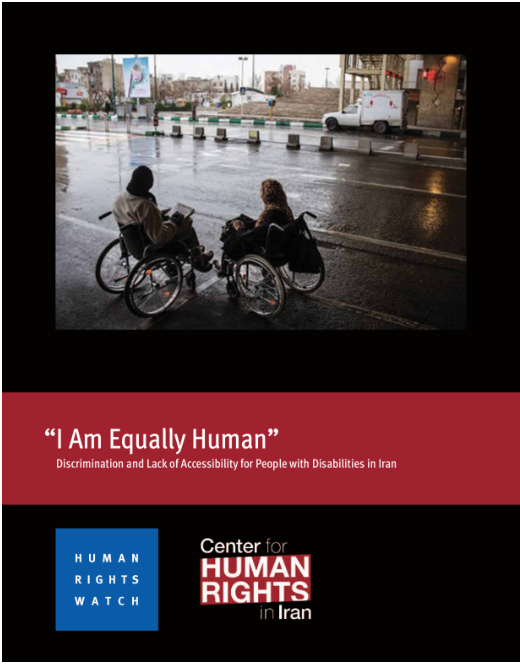Iran’s State Broadcaster Discriminates against Women, People with Disabilities and Non-Muslims

JULY 22,
2019
IRIB’s New Job Posting
Demands New Hires Be Male, Muslim and Without Disability
In its latest job posting,
the Iranian state broadcaster, the Islamic Republic of Iran Broadcasting
(IRIB), listed “complete health and lack of physical disability” and “adherence
to Islam and Velayat-e faqih [Iran’s system of clerical rule over the state]”
as employment requirements for all its branches, while adding that “being a
man” was a requirement in provincial branches.
According to the ad posted on
July 27, 2019, only abled-bodied Muslim men may be hired by the
IRIB. This posting blatantly enforces discrimination based on gender, religion
and disability, violating numerous articles in the Iranian
Constitution and other domestic laws, as well as international
conventions to which Iran is a State Party, including the International
Covenant on Civil and Political Rights (ICCPR), the International
Covenant on Economic, Social and Cultural Rights (ICESCR), the
International Labor Organization’s (ILO) Fundamental
Principles, and the Convention on
the Rights of Persons with Disabilities (CRPD).
In addition, the job
posting specifies that IRIB branches in all provinces except Tehran will
require employees to sign an employment contract that forces employees to
“legally commit to a ten-year obligation not to change his occupation or
workplace.” This restriction is a violation of the right to freedom of
employment and of an individual’s right to choose their place of residence, as
outlined in the Iranian Constitution, the ICCPR and the ICESCR.
“The [IRIB] proved it is
not law-abiding. It showed that it does not care for women’s rights, religious
minorities or the disabled,” said a Tehran-based lawyer who spoke to CHRI on
condition of anonymity.
“Expecting someone to
pledge to have no right to change his job for 10 years is a form of forced
labor, because this legal pledge deprives a person of the right to choose his
job and his place of residence for a considerable time,” he continued.
“If the Administrative
Justice Court gets involved in the case, it is likely to rule it violates the
law. But the Court is usually very slow and there are no active organizations
in Iran to go after such cases,” the lawyer added.
IRIB Violates National and
International Commitments to Equal Employment for People with Disabilities
 |
| The 72-page report, “‘I Am Equally Human’: Discrimination and Lack of Accessibility for People with Disabilities in Iran,” documents the everyday barriers people with disabilities meet when going to government offices, healthcare centers, and when using public transportation. |
In this recruitment
ad which was designed to attract people with expertise in
electrical, mechanical and computer engineering, IRIB announced that “complete
health” and “lack of physical disability” are requirements of employment. This
directly violates the Convention on the Rights of Persons with Disabilities
(CRPD), according to which member states, including Iran, are obliged to
provide all necessary measures to ensure equal access to employment
opportunities for all people with disabilities.
Paragraph One
of Article 27 of the CRPD explicitly prohibits any form of
discrimination on the basis of disability in employment. In addition,
under Article 15 of
the Iranian Law to Protect Rights of the Disabled, passed by the
parliament in March 2018, “the government is required to allocate at least
three per cent of employment licenses (official, contractual or labor-based) of
all governmental and public establishments such as ministries, organizations,
institutions, public and revolutionary institutes and other establishments that
use the national public budget, to eligible people with disabilities.”
Recruitment tests in
recent years, however, have repeatedly violated the rights of
people with disabilities. For instance, the instructions for
the fifth central recruitment exam for
employment in any government agency, published in May 2018, established
discriminatory conditions for applicants, for example excluding people with
visual and hearing impairments from teaching positions. This deprives these
individuals of the chance to participate in a recruitment test that offers
significant employment opportunities for people with disabilities in Iran.
In response to these
requirements, a number of people with disabilities addressed Iranian president
Hassan Rouhani in an open
letter, demanding the suspension of the test and the proper
implementation of the three per cent government employment quota for people
with disabilities.
Nevertheless, the
recruitment exam was held on schedule. Yet the objections led to a directive issued
by the Office of Administrative Affairs and Recruitment in September 2018,
which made the presence of State Welfare Organization representatives mandatory
during job interviews for people with disabilities.
Disability Community Reacts to
IRIB’s Discriminatory Recruitment Policies
Mohammad Kamali,
disability rights advocate and former Chair of the University of Social Welfare
and Rehabilitation wrote on
Twitter: “The gentlemen [at IRIB] again violated the law, such as
Paragraph One of Article 7 in the Comprehensive Law on the Rights of People
with Disabilities [Article 15 of the new Law to Protect the Rights of the
Disabled]. The law explicitly considers a 3% quota for this community. In
contrast, a person without an arm is proudly hired by the BBC as a children’s
show host.”
The Campaign for the
Implementation of the Law to Protect the Rights of the Disabled wrote on its
Twitter account: “[IRIB] not only produces and distributes shows and
movies that convey a negative view about people with disabilities, but has now
added ‘complete health and lack of physical disability’ to its employment
requirements.”
“Our community, despite a
great deal of difficulty, has proved to be more successful in higher education
than nondisabled people,” wrote a
Twitter user named Neda, a disability rights activist who
identifies as a person with disabilities. “But unfortunately, instead of
supporting employment, the government takes away the small three percent
quota.”
Different occupations may
require different levels of physical and mental abilities that may not be
suitable for some people with certain disabilities. However, such cases are few
in number and in many cases, people with various disabilities can be hired if
reasonable accommodation is provided. Moreover, the majority of people with
physical disabilities who have been excluded from the IRIB’s recruitment tests
would not need any special accommodation for this particular job.
Discrimination against Women
and non-Muslims
In addition to people with
disabilities, IRIB is also directly and explicitly discriminating against women
and religious minorities in its hiring practices. The recent job posting has
imposed gender restrictions in all provinces but Tehran, stating, “Applicants
must be male and a native of the relevant province.”
Depriving women of the
right to work in many professions, especially engineering is a common practice,
and one that is openly declared in public and private recruitment ads in which
employers state their preference for male applicants without providing any
explanation. In contrast, administrative and secretarial positions are often
offered exclusively to women, demonstrating the extent to which gender
stereotypes are prevalent in Iran. However, discrimination in employment based
on gender is illegal and violates Article 20 of the Iranian Constitution and
Article 3 of the ICCPR, as well as Article 3 of the ICESCR.
In addition, “adherence to
Islam and Velayat-e Faqih” as an employment requirement deprives religious
minorities, even those religions recognized by the Iranian Constitution, of
employment at the organization.
“There was a lot of debate
about whether ‘adherence to Islam and Velayat-e Faqih’ could be a requirement,”
a Tehran-based lawyer told CHRI, “and some suggested that a pledge was
sufficient, meaning that the employee would pledge to work in accordance to
Islam and Velayat-e Faqih. But determining people’s ‘adherence’ requires
questioning people’s beliefs, and that is not acceptable.”
“Unfortunately, requiring
‘adherence to Islam’ is very common in government job postings.
Even for simple positions
like administrative ones, which can require little political or cultural
sensibility, non-Muslims are excluded. It’s not clear why,” the lawyer added.
Requiring Workers to Remain in
the Job for 10 Years is Illegal
The job posting also
states that employees in all provinces other than Tehran will be required to
sign a pledge through which they commit not to quit or ask for a location
change for 10 years.
The justification for this
requirement is the high demand for Tehran as a work location.
Yet no such justification
makes it legal or ethical to require a ten-year commitment from employees.
According to Article 21 of Iran’s Labor Law, resignation is
the right of the employee, and similar to the employer, employees have the
right to terminate contracts by giving a one-month notice. Thus IRIB is denying
employees’ legal right to resign. As for prohibiting requests for location
change, it could have been justified had it not been paired with the long-term
employment commitment.
Articles 6 and 7 of
the Covenant on
Economic, Social and Cultural Rights, which the government of Iran
is legally bound to, requires states to respect the freedom of individuals to
choose their job.
Additionally, the ten-year
employment commitment violates an individual’s right to choose their place of
residence. Only by law and as punishment may one be forced to stay in a given
location for a period of time. Although employers may face a shortage of
workers in less desirable cities, managing the shortage may not lead to a violation
of employees’ rights.
Instead, offering
additional benefits for employees in less desirable areas as inducements is one
of many possible solutions to this problem.
SWO Responds to IRIB’s
Discriminatory Recruitment Ads
On July 8, 2019, Head of
SWO Vahid Ghobadi-Dana addressed the
issue of the organization’s discriminatory recruitment ad in
an open letter to IRIB
Head Dr. Abdolali Ali Askari. Referencing the demands for equal employment
opportunities in Article 27 of the CRPD and Article 15 of the Iranian Law to
Protect Rights of the Disabled, Ghobadi-Dana wrote: “Despite the emphasis in
relevant laws, we see how employment examinations from various institutions and
organizations disregard the absolute right of people with disabilities. ‘Lack
of disability’ as a requirement in recruitment ads prevents disabled people
from accessing demanded job opportunities.”
“SWO expresses its
readiness for a joint meeting with you and senior directors of [IRIB] to
explain the capabilities of people with disabilities,” he added.
SWO Rehabilitation
Director Mohammad Nafarieh said in an
interview with ISNA on July 12 that the three per cent quota of
openings (reserved for people with disabilities) would not be given to people
without disabilities if enough people with disabilities were not hired each
year, and would instead be carried over to the following years.
No comments:
Post a Comment